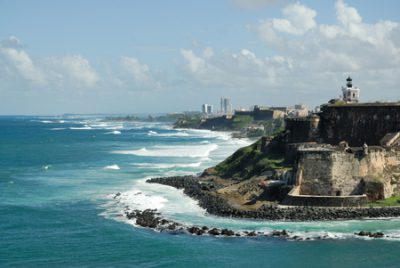Recovery of Investment Losses in Puerto Rico COFINA Bonds
Did you lose money investing in Puerto Rico COFINA Bonds at the recommendation of your broker? If so, the attorneys at The White Law Group may be able to help you recover your losses by filing a FINRA Arbitration against the brokerage firm that employs him.
What are Puerto Rico COFINA Bonds?
Puerto Rico COFINA bonds or Puerto Rico Urgent Interest Fund Corporation Bonds, are attached to Puerto Rico’s sales tax. COFINA is a corporation that is owned and controlled by the Puerto Rican government. When it issues debt, the funds that will be used for repayment comes directly from sales tax revenue.
This is the main feature that distinguishes COFINA bonds from general obligations bonds. General obligation bonds or GO bonds are not tied to any specific funding mechanisms. Instead, those bonds are backed by the full faith and credit of the Puerto Rican government as well as the island’s constitution.
Puerto Rico’s ‘Sales and Use Tax’, which is the specific tax that supplies revenue for COFINA bondholders, charges a 7 percent fee on many different sales and transactions that are conducted on the island. The revenue raised by this 7 percent tax is as follows:
- 21.4 percent of the tax revenue (1.5 percent overall) goes to the local municipal government;
- 39.2 percent of the tax revenue (2.75 percent overall) goes to the state government; and
- 39.2 percent of the tax revenue (2.75 percent overall) goes to COFINA bondholders.
History of Puerto Rico COFINA Bonds
COFINA was created in 2006 to refinance appropriation debt of the Commonwealth of Puerto Rico ($6.8 billion 6-30-06). Legislation in 2009 expanded the corporate purpose to include funding of the Commonwealth’s deficit through 2012 as well as certain other needs. Between 2007 and 2010, COFINA –the Spanish acronym for Puerto Rico Sales Tax Financing Corporation– had issued more than $14 billion in senior and subordinated debt.
This was based on a broad based consumption tax, offering strong revenue support and debt service coverage.
At that time, current collections were estimated to equal only 50-60% of potential collection and non-impairment provisions of enacting legislation protected the revenue source. The bonds were secured by sales tax revenues based on the Commonwealth’s 5.5% sales tax with another 1.5% to be levied by local municipal governments.
The tax was applied to most products and services but excluded automobiles and energy. The Secretary of the Treasury had authority to establish further exemptions and limitations. Certain goods and services could be exempted if the governor declared a state of emergency. In 2008, the legislature created a three day back-to-school holiday when tax on some items was exempt.
Puerto Rico’s Record Breaking Bankruptcy Proceedings
Last month, Puerto Rico and its federal financial oversight board got hit with an onslaught of lawsuits from COFINA bond holders, GO bondholders and bond insurer Ambac Assurance Corp.
COFINA bondholders allege that the island’s debt-cutting plans violate the U.S. Constitution.
The GO bondholders are demanding payment on $242.5 million of debt defaulted upon since July, and damages and interest of more than $102 million.
Ambac, which insures $2.2 billion of Puerto Rican bonds, filed four lawsuits, including two against the island’s government and another against U.S. Treasury Secretary Steven Mnuchin, seeking a lien on Puerto Rican rum taxes collected by the U.S. Treasury Department.
This torrent of litigation led to the largest U.S. municipal bankruptcy proceeding to date with $70 billion debt load and $49 billion in pension liabilities. With a 45 percent poverty rate and near-insolvent public health and pension systems, islanders are leaving Puerto Rico and heading to mainland U.S. by the droves.
GO Bond Holders VS. COFINA Bond Holders
Although Puerto Rico’s constitution guarantees the debt of GO bondholders, and COFINA debt is backed by revenue streams from tax proceeds, questions remain as the battle continues.
While GO bond holders may have an advantage out of court, the opposite may be true in bankruptcy where unsecured debt may not take priority over debt backed by revenue.
Nonetheless, Moody’s has rated the commonwealth’s GO and COFINA debt on equal footing, forecasting recoveries for both between 65 and 80 cents on the dollar, and ahead of debt from Puerto Rican agencies like the Government Development Bank, which it sees as recovering less than 35 cents.
Recovery of Investment Losses in COFINA bonds
The White Law Group is investigating the liability that brokerage firms may have for improperly selling Puerto Rico COFINA Bonds such as the following offerings:
Sales Tax Revenue Bonds Senior Series 2011C
Sales Tax Revenue Bonds Senior Series 2011D
Sales Tax Revenue Bonds First Subordinate Series 2011B
Sales Tax Revenue Bonds First Subordinate Series 2011A
Sale Tax Revenue Bonds First Subordinate Series 2010D
Sale Tax Revenue Bonds First Subordinate Series 2010E
Sale Tax Revenue Bonds First Subordinate Series 2010C
Sale Tax Revenue Bonds First Subordinate Series 2010A
Sales Tax Revenue Bonds First Subordinate 2009B
Sales Tax Revenue Bonds First Subordinate Series 2009A
Sales Tax Revenue Bonds First Subordinate 2009C
Sales Tax Revenue Bonds Senior Series 2009C
Sales Tax Revenue Bonds Series 2008A
Sales Tax Revenue Bonds Series 2008B
Sales Tax Revenue Bonds Series 2008C
Sales Tax Revenue Bonds Series 2007C
Sales Tax Revenue Bonds Series 2007B
Sales Tax Revenue Bonds Series 2007A
Recovery of Investment Losses in Puerto Rico COFINA bonds
Broker dealers are required to perform adequate due diligence on all investment recommendations to ensure that each investment recommendation that is made is suitable for the investor in light of the investor’s age, risk tolerance, net worth, financial needs, and investment experience.
Fortunately, FINRA does provide for an arbitration forum for investors to resolve such disputes and if a broker or brokerage firm makes an unsuitable investment recommendation or fails to adequately disclose the risks associated with an investment they may be found liable for investment losses in a FINRA arbitration claim.
If you suffered losses investing in Puerto Rico COFINA Bonds, the attorneys at The White Law Group may be able to help you recover your losses by filing a FINRA Arbitration claim against the brokerage firm that recommended the investment to you.
The White Law Group, LLC is a national securities fraud, securities arbitration, investor protection, and securities regulation/compliance law firm with offices in Chicago, Illinois and Franklin, Tennessee. The firm represents investors throughout the country in claims against their brokerage firm.
For a free consultation with one of the firm’s securities attorneys, please call (888) 637-5510.
For more information on The White Law Group, visit www.WhiteSecuritiesLaw.com.
Tags: Chicago securities attorney, Chicago securities lawyer, COFINAs investigation, COFINAs lawsuit, COFINAs losses, Corporación del Fondo de Interés Apremiante class action, Corporación del Fondo de Interés Apremiante complaints, Corporación del Fondo de Interés Apremiante demanda judicial, Corporación del Fondo de Interés Apremiante investigación, Corporación del Fondo de Interés Apremiante investigation, Corporación del Fondo de Interés Apremiante lawsuit, Corporación del Fondo de Interés Apremiante losses, Corporación del Fondo de Interés Apremiante Pérdidas de inversión, Puerto Rico COFINA bonds, Puerto Rico Cofina bonds class action, Puerto Rico COFINA bonds complaints, Puerto Rico Cofina bonds investigation, Puerto Rico Cofina bonds lawsuit, Puerto Rico Cofina bonds losses, Puerto Rico COFINA bonds recovery options, Puerto Rico Urgent Interest Fund Corporation Bonds class action, Puerto Rico Urgent Interest Fund Corporation Bonds complaints, Puerto Rico Urgent Interest Fund Corporation Bonds investigation, Puerto Rico Urgent Interest Fund Corporation Bonds lawsuit, Puerto Rico Urgent Interest Fund Corporation Bonds losses, Puerto Rico Urgent Interest Fund Corporation Bonds recovery options, Puerto Rico’s Sales and use tax, Sale Tax Revenue Bonds First Subordinate Series 2010A lawsuit, Sale Tax Revenue Bonds First Subordinate Series 2010C investment losses, Sale Tax Revenue Bonds First Subordinate Series 2010D class action, Sale Tax Revenue Bonds First Subordinate Series 2010E complaints, Sales Tax Revenue Bonds First Subordinate 2009B losses, Sales Tax Revenue Bonds First Subordinate 2009C losses, Sales Tax Revenue Bonds First Subordinate Series 2009A investigation, Sales Tax Revenue Bonds First Subordinate Series 2011A losses, Sales Tax Revenue Bonds First Subordinate Series 2011B investigation, Sales Tax Revenue Bonds Senior Series 2009C lawsuit, Sales Tax Revenue Bonds Senior Series 2011C losses, Sales Tax Revenue Bonds Senior Series 2011D lawsuit, Sales Tax Revenue Bonds Series 2007B recovery options Sales Tax Revenue Bonds Series 2007A complaints, Sales Tax Revenue Bonds Series 2007C lawsuit, Sales Tax Revenue Bonds Series 2008A investigation, Sales Tax Revenue Bonds Series 2008B losses, Sales Tax Revenue Bonds Series 2008C class action, Vero Beach securities attorney, Vero Beach securities lawyer Last modified: January 5, 2023








